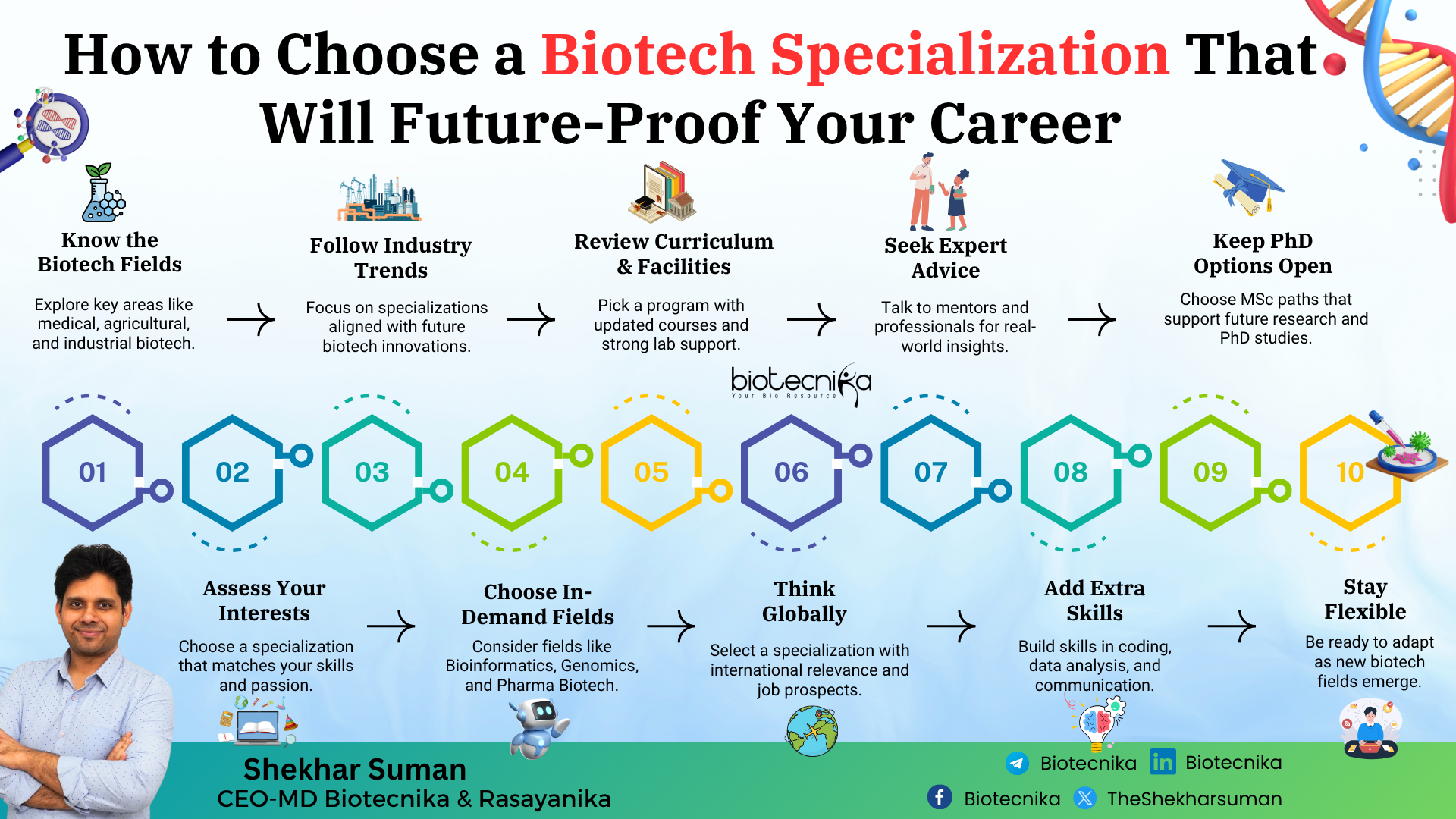Choosing the Best Biotech Specialization for a Successful Career
A rush of pride washed over Rayan as he walked across the stage to receive his bachelor’s degree in biotechnology. But soon, it was followed by a wave of uncertainty. With genomics, bioinformatics, pharmaceutical biotech, and dozens of other specializations, he was confused and overwhelmed. Which path would align with his passion and provide him with a stable career? The biotech tidal waves are rapidly changing with automation and AI, and this has made Rayan numb. He was unable to understand which was the best biotech specialization for jobs in this evolving sector.
He was not alone. This is the silent struggle of thousands of biotech graduates every year. In this dynamic field of science, where new discoveries disrupt entire industries overnight, the job market looks promising yet unpredictable. It demands not just knowledge but the right specialization to stay ahead.
This article will help you make a wise decision about your biotech specialization. Whether you are fascinated by gene editing or inspired by AI in drug design, we will walk you through the process of choosing a biotech specialization. Let’s build a future-proof career in this fast-evolving field of biotechnology.
- Know the Core Branches of Biotechnology
Before getting into specialization, you have to understand the fundamentals of the field. Thus, here is the list of major branches of biotechnology:
- Medical and Pharmaceutical Biotechnology: Focused on diagnostics, therapeutics, and vaccine development.
- Agricultural Biotechnology: Involves genetic engineering of crops, sustainable farming practices, and pest resistance.
- Industrial Biotechnology: Uses enzymes and microorganisms to produce bio-based products such as biofuels, plastics, and chemicals.
- Environmental Biotechnology: Concerned with pollution control, bioremediation, and sustainable environmental practices.
- Bioinformatics and Computational Biology: Deals with managing and analyzing biological data using computational tools.
- Genomics, Proteomics, and Transcriptomics: Involves the comprehensive study of genes, proteins, and RNA molecules.
- Synthetic Biology: Combines biology, engineering, and computer science to innovate new biological parts and systems.
These areas offer a wide range of specializations for aspiring biotech graduates. Students can select their specialization based on their interests and career goals.
- Self-Assessment
Now that you have understood the core biotech areas, you must understand your strengths, passion, and career aspirations. To ease your process, here are a few questions you must answer before choosing your specialization.
Questions to ask yourself:
- Am I more interested in research, product development, data analysis, or fieldwork?
- Do I prefer working in a lab, in front of a computer, or applied industry settings?
- Do I see myself pursuing a PhD or working in the corporate sector?
- Which subjects or projects excited me the most during my undergraduate studies?
Being honest about what excites you and where your natural strengths lie will help narrow your options effectively.
- Study Future Industry Trends to understand the best biotech specialization for jobs
With the advancement of technology, the biotech industry is undergoing significant changes. To build a secure future, you need to align your specialization with emerging technologies. The job market demands skilled employees with knowledge of the latest technologies. Your specialization shapes your way out in the job market.
Top Emerging Specializations for MSc Biotechnology Students:
i. Bioinformatics and Computational Biology
If you enjoy data science and coding, then here is your chance to build an impactful career in biotechnology. This subject plays an important role in interpreting large, complex biological data. You will explore genomic, proteomic, and clinical data.
Core topics include:
- Machine learning in biology
- Genomic data analysis
- Drug target identification
- Structural bioinformatics
Career prospects:
- Bioinformatics analyst
- Computational biologist
- Genomics data scientist
- AI in drug discovery
Future outlook: Strong demand in pharma, hospitals, research labs, and personalized medicine.
ii. Genetic Engineering and Genomics
With technologies like CRISPR-Cas9 revolutionizing biology, genetic engineering is among the most impactful specializations today.
Core topics include:
- Gene editing and CRISPR
- Molecular cloning
- Functional genomics
- Genetic diagnostics
Career prospects:
- Genomic scientist
- Molecular biologist
- Biotech researcher
- Gene therapy specialist
Future outlook: Expanding use in agriculture, human disease research, and hereditary condition treatments.
iii. Pharmaceutical Biotechnology
This field focuses on the design and development of drugs, including vaccines and biologics.
Core topics include:
- Biopharmaceuticals
- Immunotechnology
- Drug formulation and delivery
- Clinical trials and regulation
Career prospects:
- Biotech product manager
- Drug Safety Associate
- QA/QC professional
- Regulatory affairs officer
Future outlook: There is a booming demand for vaccine development, biosimilars, and monoclonal antibody production.

iv. Synthetic Biology
This innovative specialization merges biology and engineering to design new biological systems and organisms.
Core topics include:
- Genetic circuits
- Metabolic engineering
- Microbial cell factories
- Systems biology modeling
Career prospects:
- Biotech entrepreneur
- Synthetic biologist
- Industrial bioprocess engineer
- Biodesign researcher
Future outlook: Strong interest from venture capitalists and start-ups; huge industrial potential.
v. Environmental Biotechnology
This field is ideal for those passionate about sustainability, waste treatment, and climate change solutions. This is the best biotech specialization for jobs if you are an environmental enthusiast.
Core topics include:
- Bioremediation
- Waste-to-energy technologies
- Biofertilizers and biopesticides
- Microbial ecology
Career prospects:
- Environmental consultant
- Sustainability officer
- Researcher in climate biology
- Water treatment scientist
Future outlook: Key contributor to achieving global climate goals.
vi. Agricultural Biotechnology
Agriculture has always been the backbone of our society. With the growing food demands and climate change challenges, agricultural biotechnologists have a crucial role to play in enhancing crop yield, resilience, and sustainable farming.
Core topics:
- Plant tissue culture, GMOs
- Drought- and pest-resistant crop development
- Biofertilizers, biopesticides
- Molecular breeding, CRISPR in plants
Career prospects:
- Crop scientist, plant biotechnologist
- R&D in seed/agrochemical firms
- Agrigenomics analyst
- QA/QC and regulatory roles
- Positions in ICAR, IRRI, CGIAR, etc.
Future outlook: A high-impact field, especially in developing nations, with growing opportunities in sustainable agriculture and climate-resilient food systems.
- Evaluate Curriculum and University Resources
Choosing the right specialization alone will not make your career. You need a strong university education to strengthen your future. You may consider factors like:
- Syllabus relevance: Does the university syllabus cover advanced topics like CRISPR, AI, or NGS?
- Research facilities: Are there well-equipped labs and accessibility to industry-level instruments in the university?
- Faculty expertise: Are the professors active researchers with industry ties?
- Internship opportunities: Are there any exciting collaborations with pharma companies, hospitals, or thriving research centers?
Universities with strong industrial connections and research output often provide better job placements and funding opportunities.
- Consider Career Outcomes and Versatility
A future-proof specialization open doors to a wide range of dynamic career paths and not just a single job. A graduate in bioinformatics can work as:
- A data analyst in pharma
- A genomics researcher in academia
- A software engineer in healthtech
- A regulatory analyst in clinical research
Look for specializations that allow you to pivot between sectors if market dynamics shift.
- Global Demand and Geographic Relevance
Biotech job markets vary globally. Some specializations have strong demand in specific regions.
- Germany and Switzerland: Pharmaceutical biotech and regulatory sciences
- USA and UK: Genomics, bioinformatics, synthetic biology
- India and Brazil: Agricultural and environmental biotech
Consider your willingness to relocate or study abroad, and choose a specialization with international recognition and relevance.
- Talk to Mentors, Alumni, and Industry Professionals
Direct insights from those already in the field can be incredibly valuable. Get in touch with mentors to know more about the best biotech specialization for jobs.
- Professors in each specialization
- Alumni who pursued careers in your areas of interest
- LinkedIn professionals in biotechnology roles
What to ask:
- What does a typical day in your job look like?
- Which skills helped you succeed?
- Would you choose this specialization again?
Real-world stories often reveal nuances that academic brochures miss.
- Build Complementary Skills
Regardless of specialization, biotech professionals are expected to possess specific cross-functional skills. Key complementary skills:
- Coding and Data Analysis – Especially Python, R, MATLAB
- Scientific Writing: For publishing and grant writing
- Communication Skills: For team projects and pitching ideas
- Business and IP Knowledge: Useful in product development and patent law
Many MSc programs allow electives or certificates in these areas. Choose accordingly.
- Plan Ahead for PhD or Further Research
If you are inclined towards research, select a specialization that offers a natural pathway to PhD studies. Good indicators for your PhD:
- Availability of research thesis in MSc
- Publications by faculty in top journals
- Funding for research projects
- Exposure to cutting-edge technologies
Popular research-focused tracks for PhD include:
- Stem cell biology
- Immunotherapy and cancer research
- Neurobiotechnology
- Structural biology
- Microbiome studies
With a focused MSc specialization, you can improve your chances of securing a higher PhD position, grants, scholarships, and other opportunities.
- Stay Updated and Re-evaluate Periodically
The biotech world is rapidly changing. Today’s advanced innovation may become obsolete in a decade. This field demands a lifelong commitment and learning. You can stay updated with the latest developments by:
- Subscribe to journals like Nature Biotechnology, Trends in Biotechnology, and Genome Research.
- Attend biotech conferences and webinars.
- Take online courses from Biotecnika to stay updated.
- Join biotech forums and associations (e.g., ISCB, ASM, or EMBO).
Constantly evaluate your specialization and look at how it aligns with global developments. Always be prepared to shift your career direction when needed.
The biotech industry has an incredibly bright future, but it belongs to only those who are ready to embrace it. Remember, you are not just selecting a subject. You are aligning your career with emerging technologies and global challenges. You are driven by purpose. Whether you want to cure rare genetic diseases, clean the planet, or decode the genome, your specialization is the launchpad. For a rewarding, resilient, and transformative career, select your specialization wisely. Hope the article gave you the insights on the best biotech specialization for jobs.
Keep learning, stay curious, and let your passion guide you. The intersection of science and innovation is waiting, and your journey into the future of biotechnology starts now.




























